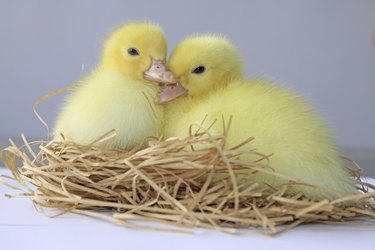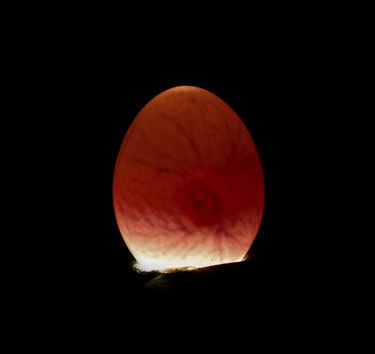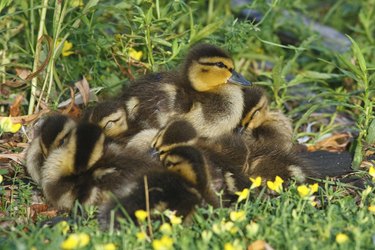Whether you brought home fertilized eggs or day-old ducklings, learning the duck development stages will help you better understand how to care for your new pets. From incubation to hatching and early life, baby duck breeds are living creatures whose specific needs must be met in order to thrive in a home environment.

Video of the Day
Duck egg incubation
A mother duck, or hen, will lay on her eggs, giving them her body heat to begin incubation, and she'll rotate them to evenly distribute the heat. Fertilized duck eggs last a week before the incubation process must begin, where heat causes the embryonic cells to divide. For most ducks who hatch at 28 days, set the incubator to 99.5 degrees Fahrenheit during the first 25 days, then lower it to 98.5 degrees for days 26 through 28.
Video of the Day
Adjust accordingly for different incubation periods. For example, mallards only need 26 days and Muscovy ducks can take up to 35 days. No matter the breed, turn the eggs daily, especially during the first week, with the larger end up.
Egg duck development stages

A fertilized egg contains three essential components. The shell is a source of calcium for the embryo to develop cartilage and bone, while the yolk is comprised of fat and the white albumen is protein. Within the first days of incubation, the cells divide into the nervous system and spinal column. Blood cells and arterial veins then develop, the heart pumping blood to distribute food from the yolk to capillaries in the limbs, and to exchange carbon dioxide for oxygen through the porous shell.
Finally, feet, beaks, and feathers develop. Towards the end of incubation, the embryos will emit clicking sounds. This communication helps the less developed embryos catch up, both quickening their metabolism and developing tissues. You can quietly talk back to them, just as the mother duck would as a part of imprinting.
Hatching baby ducklings
Hatching can last several hours; the eggs were not laid all at once, so don't expect ducklings to hatch all at the same time. Though you'll want to intervene if necessary, ducklings that progress in breaking through the shell should be left alone. The only ducklings who need help are those who make no progress after 12 hours or who are stuck after breaking the shell.
There's no need to feed the ducklings for the first 24 hours as the remaining yolk has been absorbed into their abdomen for sustenance. Simply watch as the ducklings' feathers dry and fluff.
Initial duck growth chart

As the role of mother duck, you must provide food, warmth, and shelter for the baby ducklings until they mature. The day after hatching, move them into a brooder box lined with an old towel or clothing; newspaper doesn't provide enough traction, and straw creates an unnecessary mess. Place a 60- to 75-watt bulb to one side of the box to give ducklings a source of heat but also an area to move away from it if they become overheated.
Along with a non-medicated feed, the ducklings need water though they're still too young to swim. Their oil glands develop at five to six weeks of age and they'll start preening or spreading the water-resistant oil over their feathers.
In the meantime, protect them from drowning by making sure they can drink from a water dish that is not big enough for them to jump into. While the ducklings should be encouraged to walk around to strengthen their legs, you must also protect them from predators, such as other household pets.